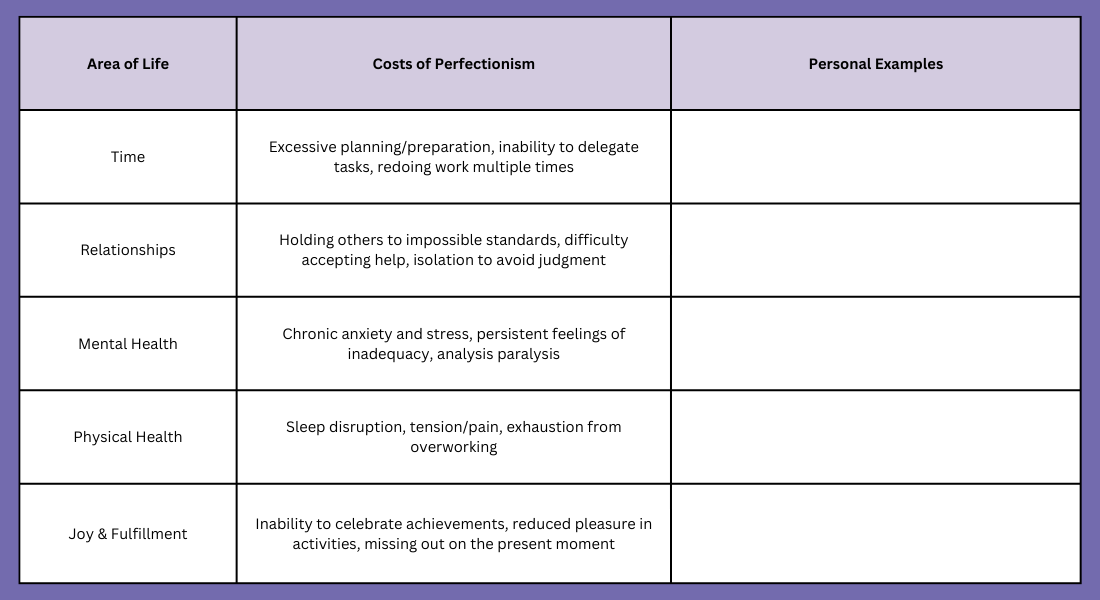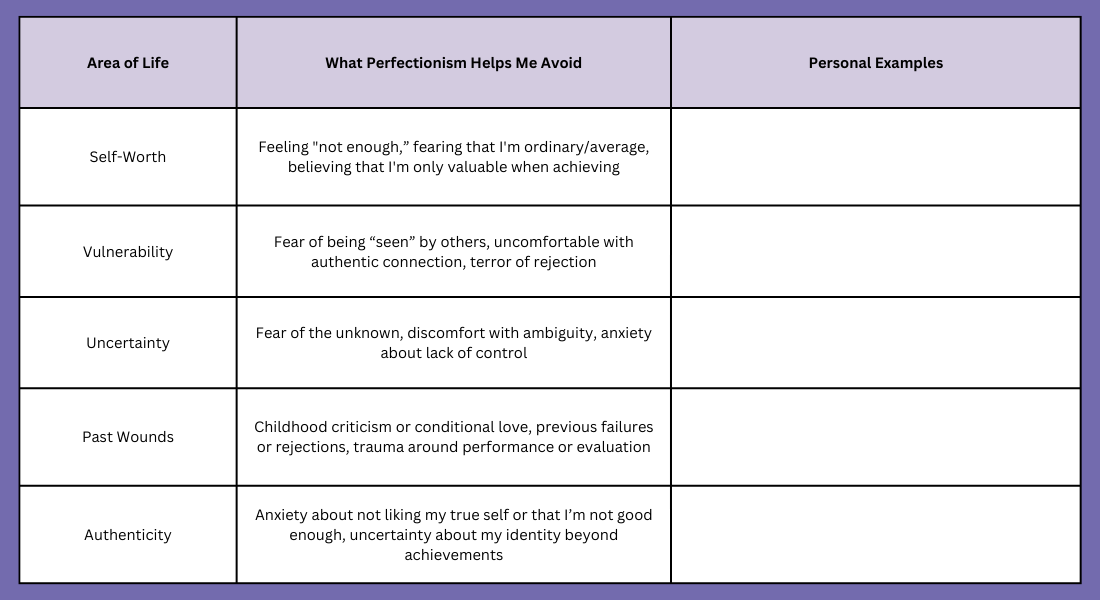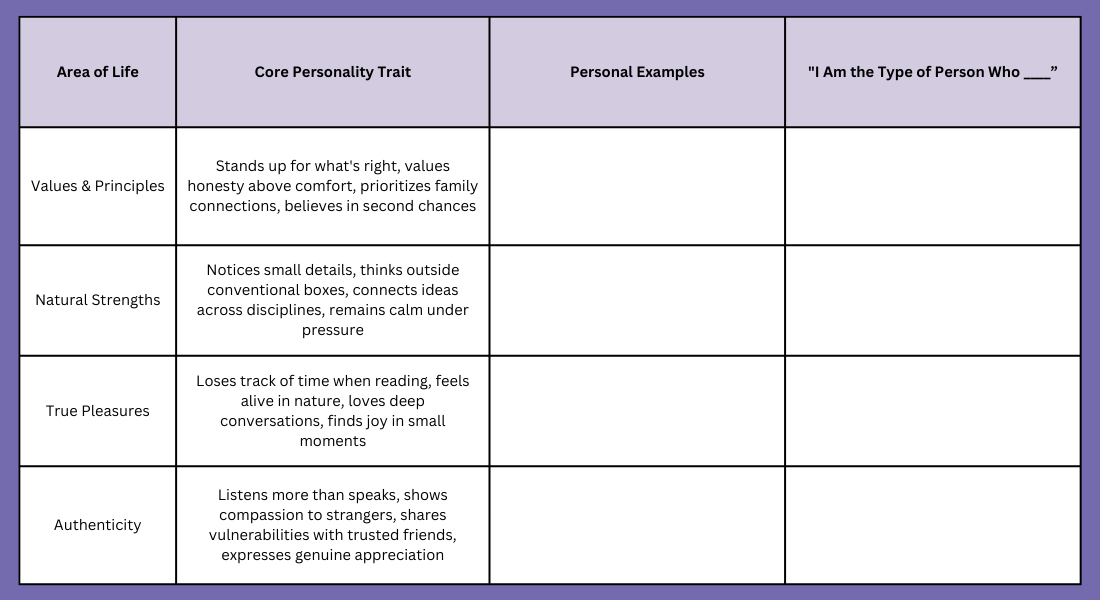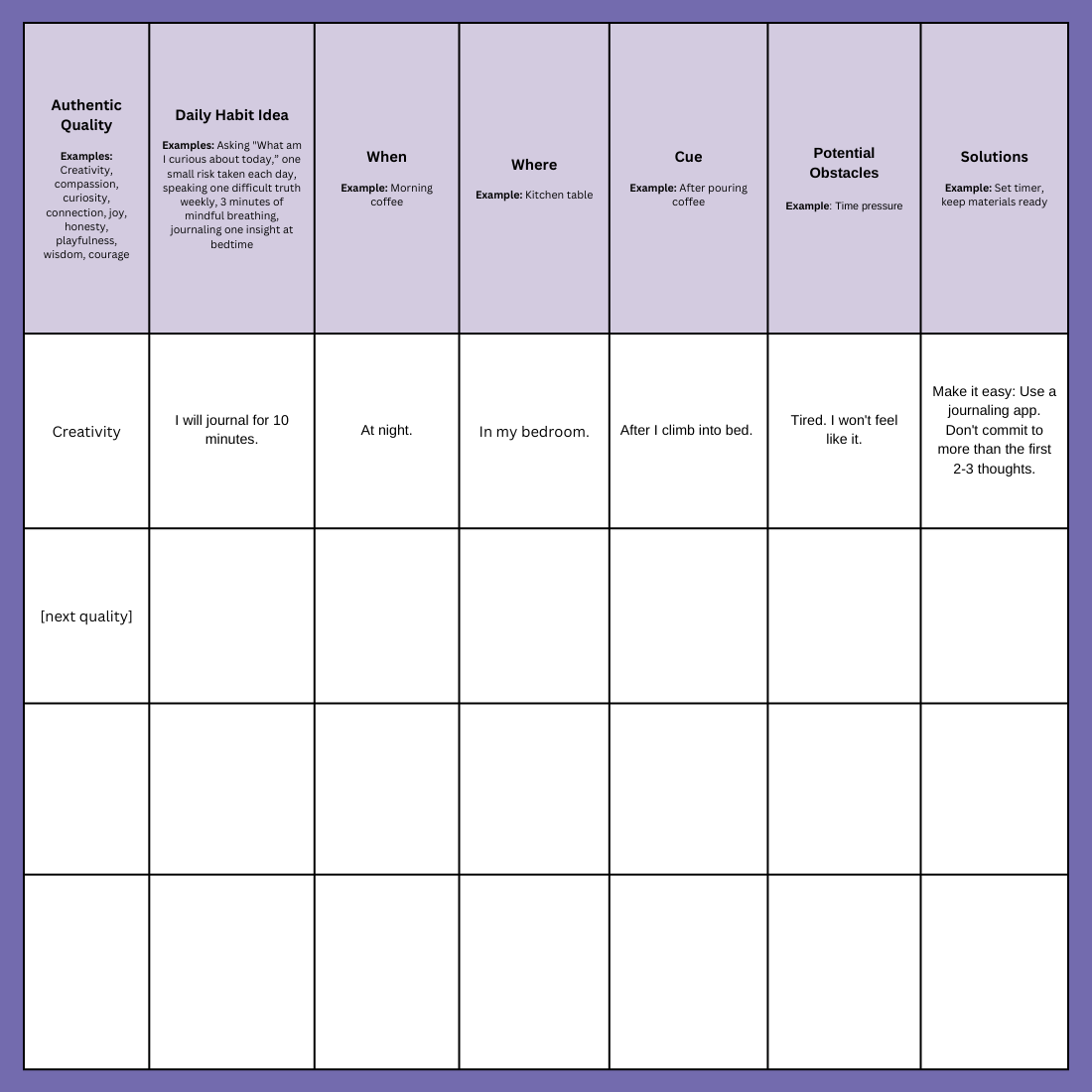Your Happiness Died When Perfectionism Took Over
Remember your authenticity with these 4 worksheets
My entire life, I was terrified of making mistakes.
Regardless of the circumstances, I did everything possible to maintain a persona of competence and composure. And when I inevitably failed, I would lay awake at night and toss and turn over being labeled as “less-than-flawless.”
It was bone-deep exhausting. But it was also my identity.
Eventually, I showed myself some honesty and compassion. And I immediately recognized how, for decades, I’d used perfectionism to conceal my deeply rooted shame.
About aspects of my childhood. About my mental health concerns. And about how I always felt like I was an extra in someone else’s movie.
So, I stopped running.
Instead of continuing to fabricate an idealized version of myself, I got really uncomfortable, put in the dirty work, and created deliberate daily habits that helped me rediscover my authentic identity. A bottom-up approach versus a top-down one.
Because as James Clear emphasizes in Atomic Habits, our habits form our identity, and our identity shapes our lives.
This begs the question: “If you’re miserable, why do you allow your perfectionist habits to keep you stuck?”
After a lot of trial and error, I learned that authenticity is the antidote to perfectionism. The two cannot coexist in the same space.
Therefore, if you want to show your perfectionism the door, you must get reacquainted with yourself and then build habits that help you live your life around your core identity.
These four progressive worksheets can help you get started.
Overcome Perfectionism & Live Authentically Using These Worksheets
1. Acknowledge the Costs
Most of us are terrified of looking at the “ugly” parts of ourselves.
Therefore, we paper over our authenticity with unhealthy coping mechanisms like perfectionism. Sure, they might work in the short term, but they often have devastating consequences for our mental, physical, and spiritual health over the long term.
To ensure these costs cause as little chaos as possible, you need to bring them to the forefront of your awareness. Doing so creates a crack in your ego’s “shell,” which has shielded your perfectionism and allowed it to thrive for so long.
After all, you can’t change what you can’t see, right?
Instructions: Take a moment to reflect. For each category, write down specific examples of how perfectionism creates difficulties in your daily life. Download link below.
1a. Deeper Reflection
Which of these areas is most affected by your perfectionism? Did you notice any patterns?
What possibilities would open up if you loosened your grip on perfectionism?
2. Find the Seed
“At its root, perfectionism isn’t really about a deep love of being meticulous. It’s about fear. Fear of making a mistake. Fear of disappointing others. Fear of failure. Fear of success.” ― Michael Law
With your ego’s “shell” cracked, you can move past its defenses and reach your core.
Because ultimately, the answers you seek aren’t about perfectionism. Instead, they’re about the aspects of yourself that perfectionist behaviors help you run from.
Instead of using perfectionism to avoid uncomfortable truths or feelings, rip the Band-Aid off. Get raw. Be honest with yourself.
Instructions: For each area below, reflect on what your perfectionism helps you avoid.
2a. Deeper Reflection
Which avoidance pattern resonates most strongly with you? How might life change if you didn't utilize perfectionism as protection?
What small step could you take toward accepting what you've been avoiding?
3. Remember Yourself
Once you recognize your excuses for your perfectionist behaviors, you open the door to exploring deeper truths.
Because, beneath your achievement-seeking and people-pleasing lies your authentic self, which doesn't need to prove its worth or earn its place in the world—it simply is. Now, you have the space to reflect on who you are after dropping your masks.
Instructions: Use this worksheet to reconnect with your authentic self beyond achievements or others' expectations. Complete each column with an honest reflection about who you are at your core.
For the final “I am the type of person who” column, include the qualities of a person who embodies those core personality traits. In other words, if you exemplified those characteristics, how would you describe yourself? What would those traits say about who you are as a person?
3a. Deeper Reflection
Which of these authentic traits do you most easily express in your daily life? Which feel hidden or suppressed by perfectionism?
Choose one authentic "I am" statement you want to fully embody this week. How might you act from these truths? (We’ll dive more into this next, but think of a few high-level answers).
4. Create Authentic Habits
Now, you can embody your new authenticity through actionable daily habits.
As you develop these habits, remember to focus on meaning over perfection. Approach this process with self-compassion, and as you build these habits, prioritize self-care and self-validation over external approval.
Instructions: Use this worksheet to develop small, sustainable daily habits that allow your authentic self to shine through. Focus on practices that feel energizing rather than depleting. Start tiny, celebrate progress, and allow your habits to grow organically.
4a. Reflection Questions
Which habits feel most energizing?
How might these habits help you fully express your authentic self?
What are the smallest versions of these habits you could begin tomorrow, and how would implementing them change your relationship with perfectionism?
From Perfectionism to Freedom: Your Path Forward
As you integrate these new habits, remember that it’s not about perfection. It's about giving yourself the freedom to be beautifully flawed and constantly evolving.
By acknowledging the costs, finding the root causes, remembering who you are, and creating habits that honor that truth, you're coming home to yourself.
The path won't always be straight or easy (or perfect!), but it will be authentically yours.
And that makes all the difference.









I don’t know anyone who doesn’t or hasn’t struggled with perfectionism, including myself. Which is to say everyone is living with shame, as you pointed out. A vital topic and great article.
Derek — this is courageous, clear, and incredibly grounding.
The way you traced perfectionism back to its emotional roots — not as a personality quirk, but as a coping mechanism wrapped around shame — really hit me. That line about being an “extra in someone else’s movie”? That one lingered.
What I appreciate most is how you didn’t just name the problem, you offered a path forward. Not a “fix” — but a slow, human unraveling. One built on honesty, self-compassion, and the daily discipline of authenticity. That’s real leadership, on the page and in life.
Thank you for sharing your truth — and showing that healing doesn’t have to be flashy to be powerful. You’ve created something that doesn’t just resonate… it invites reflection. That’s rare. And it matters.